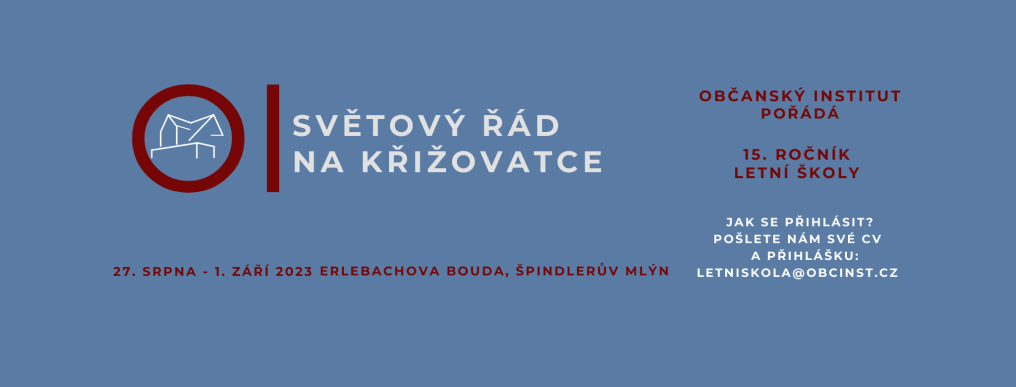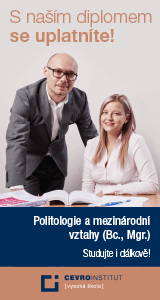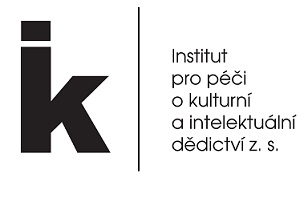MESSAGE FROM THE CHAIRMAN
At first sight, the year 1998 was not altogether successful for the Czech Republic. An economic recession, extraordinary elections and establishment of a government consisting of dignitaries among whom many word their statements in a manner attesting unequivocally to the fact that they have never ever heard of any Civic-Institute publications – hardly anything to rejoice over. I do nevertheless believe that this year will once be perceived as a transition year, a year of shedding of the illusion that right and proper developments can be guaranteed solely by the politics. In the long run, elections are but a consequence of the kind of ideas that have prevailed in a given community. And, to a considerable extent, this is being decided in other places than in the political arena.
Two things must strike the minds of readers of the following report. First, the realization how many themes of major significance for society do exist: freedom versus order-cum-morality; a reasonable legal order; democracy versus freedom; the need of low taxes versus the growth of social expenses; the family and its role; security in the contemporary world, and many others. All these questions and problems constitute a meeting point of contrasting approaches and not only the fate of this country, but even that of the whole world depends on the kind of approach that will ultimately gain support in people´s minds and hearts.
Secondly, they will not fail to realize that there is much work but few labourers. The impressive achievements of a handful of Civic-Institute employees therefore call for admiration and approval. Both of these will find convenient expression not only in contributions for its activities but also in active interest in results of its work which will certainly be bountiful even in 1999. It is only thanks to such support and such an interest that permanent survival of freedom is possible.
Pavel Bratinka
THE READING ROOM AND PUBLISHING ACTIVITIES
Like in previous years, the CI library kept receiving supplementary titles both from home and from abroad in 1998. Though its collection consists of no more than a few thousand volumes, it is at the present time, thanks to its specific orientation, probably the most complete set of essential texts of conservative and classical liberal orientation, instantly accessible to all interested readers in the Czech Republic. This “core” receives supplements in a series of thematic studies from most diverse areas of public policy, first and foremost from the production of CI-related U.S. and West European institutions.
Thanks to a current project supported by a long-term grant of the U.S. Donner Foundation, our library collections not only keep growing but their computerized treatment is in progress. The year 1999, scheduled to be this project´s last year, will bring termination of this work and thus also easier thematic orientation in the offer of books including possibilities of communication with other libraries in this country.
In addition to books, our readers can benefit from a number of periodicals. From the Anglo-American sphere, the CI reading room offers all the most important periodicals of conservative orientation and many others – National Review, The American Spectator, Chronicles, Crisis, First Things, Policy Review, The National Interest, The Public Interest, The American Enterprise, The Salisbury Review, Modern Age, Commentary, Foreign Affairs, The American Journal of Economics and Sociology, Kultura, The Spectator, Imprimis, NATO Review, University Bookman, Southern Partisan and others may be quoted just for the sake of examples. Of home journals, our readers have at their disposal regular supplies of the “Respekt” weekly as well as of “Revue Prostor”, “Støední Evropa”, “Proglas”, “Politologický èasopis” or “Distance”.
Visitors of our reading room have the chance to leaf through periodicals difficult to obtain in the Czech milieu but not entirely devoid of interest, issued by institutions akin to CI beyond our frontiers. Of these latter let us name at least The Heritage Foundation, American Enterprise Institute for Public Policy Research, Cato Institute, Ludwig von Mises Institute, The Center for Security Policy, The Rutherford Institute, International Society for Individual Liberty, Atlas Economic Research Foundation or the Acton Institute for the Study of Religion and Liberty.
In 1998 the CI continued its publication activities. The series of monographs available hitherto has received as supplements Czech translations of Bertrand de Jouvenel´s The Ethics of Redistribution and of Charles Murray´s Losing Ground. The latter title, presenting a critique of the American social policy of the 50s-70s of this century, was published in cooperation with the “Sociologické nakladatelství” (Sociological Publishing House).
The series of irregularly published CI Studies has advanced as far as its twelfth number, the author of which is Michaela Freiová, Director of the CI´s “Family Values” program. This booklet, entitled Reflections on Family Policy, attempts to subsume the hitherto available results of this CI long-term program. The occasion of its publication, and thus also of termination of the first stage of the above-mentioned program, prompted the CI to organize, within premises of the Senate, a meeting of several tens of specialists, politicians and voluntary cooperators inaugurated by an introductory address by the Chairman of the Senate of the Czech Republic, Mr. Petr Pithart.
The same theme, that is, the family policy constitutes a focus of another brochure with lectures delivered at the World Congress of Families in 1997. It contains the following contributions:
Jean-Didier Lecaillon: What are Causes and Consequences of the Demographic Implosion of the Late 20th century?
Helga Herman: Twentieth Century Programs of State Family Assistance: What Have We Learned?
Alan Tapper: Twentieth Century Programs of State Family Assistance: What Have We Learned?
Allan C. Carlson: Toward the Virtuous Economy
Interest in the regularly published CI Bulletin monthly keeps growing. The year 1998 brought forth twelve texts from the following authors:
No. 77
Roman Joch: The First International Conservative Congress. Washington, D.C., September 27-28, 1997
No. 78
David Pryce-Jones: Corruption Rules the World
No. 79
Robert G. Perrin: Robert Nisbet and the Modern State
No. 80
Kenneth R. Timmerman: Strobe Talbott – Russia´s Man in Washington
No. 81
Norman Podhoretz: How the Gay-Rights Movement Won
No. 82
Ronald Bailey: Who is Maurice Strong? International Man of Mystery
No. 83
Fareed Zakaria: The Rise of Illiberal Democracy
No. 84
David Pryce-Jones: European Union – A Disaster in the Making
No. 85
Roman Joch: New Atlantic Initiative. Congress of Istanbul, 1st-3rd of May, 1998
No. 86
Russell Kirk: Burke and the Politics of Prescription
No. 87
Erik von Kuehnelt-Leddihn: Portland Declaration
No. 88
The Fall of the Evil Empire. Key Documents of the Cold War.
The observation that the CI Bulletin themes are frequently more than actual is attested to by the fact that a text published in Bulletin No. 76 (NATO: A Look Behind the Stage) has been reprinted in a Sunday supplement of the “Lidové noviny” daily and, even before that, in No. 76 of the “Støední Evropa” revue. The same periodical has brought, in its March number, another text published first in the CI Bulletin – an article by David Pryce-Jones “Corruption Rules the World”.
Representatives of the CI took advantage of the press pages whenever an occasion to voice their opinions on major political, social and economic issues concerning the Czech Republic and contemporary world in general presented itself. In the course of the year they have published nearly seventy commentaries in main Czech national dailies such as “Lidové noviny” or “Mladá fronta Dnes” and more than twenty longer and in most cases extensive texts in other periodicals such as “Profit”, “Perspektivy”, “Støední Evropa”, “Revue Prostor”, “Mezinárodní katolický report”, “Distance” or “Pravý úhel”. In addition to that, the “Radio Proglas” broadcasting station kept emitting regular issues of Michaela Freiová´s “Family values” series throughout the year and CI members participated in other radio and TV broadcasting (Czech TV, “Prima” TV, “Radiožurnál”, BBC and elsewhere).
CONFERENCES, SEMINARS, LECTURES
The CI programs regularly held in the course of recent years include three-day seminars for social- and humanity-science students entitled Christian Perspective and Free Society. In 1998, a Spring session of this seminar took place in Prague while an Fall session was held in Plzeò (Pilsen) where the local branch of the Young Conservatives organization and the local convent of Dominican friars helped with the preparations. The lecturers were much the same as in preceding years – Roman Joch, Michaela Freiová, Michal Semín and Jiøí Fuchs, a close cooperator of the CI. The themes are constant as there is a new audience every year: philosophical and ethical delimitations of freedom, the natural law, critique of value relativism and of legal positivism, conservatism and liberalism, limits to the government´s interference into the social life, subsidiarity, Christian roots of civil society, etc.
Roman Joch, Jiøí Fuchs and Michal Semín have presented a similar program at a seminar held at Trnava university (Slovakia), organized by the CI in cooperation with the Trnava university.
Participants in the preceding courses of the Christian Perspective and a Free Society seminar met at Svatý-Jan-pod-Skalou at the end of June in a four-day seminar entitled Has Democracy Any Future? Those present there enjoyed a choice of speakers of a very wide opinion range. In addition to Michaela Freiová and Roman Joch of the CI, perspectives of democracy were outlined by Daniel Kroupa, a conservative politician, Jiøí Fuchs, a Realist philosopher, Václav Žák, a left-wing liberal writer, Radomír Malý, a Catholic traditionalist, Miloslav Ransdorf, a Communist, Josef Štogr, an independent intellectual, Pavel Mayer, O.P., a Dominican friar and protector of unborn life, as well as Pavla Jedlièková, a specialist in the history of Franco-period Spain.
In 1997, the CI has inaugurated its new program – a seminar for high-school teachers of social- and humanity sciences entitled Political Philosophy for Civil Society and Free Republic. The last one of a cycle of one-day seminars took place in January of 1998 and centered on questions of foreign policy. Pavel Bratinka, Chairman of the CI Board of Directors, spoke about the importance of a peacemaking effect of integration processes in Europe while Michal Semín presented a critique of European integration. His target was not the idea in itself but its actual form, lacking the loyalty of people concerned and thus threatening to lead to evils potentially greater than those currently under attack from its partisans. The next lecturer, Daniel Kroupa, took a different position: he advocated European integration as both the best within the range of momentary opportunities and a chance for the future, especially for smaller countries. In the final lecture, Roman Joch spoke about the history, purpose and present form of the NATO, as well as on the importance of its planned extension.
A considerable measure of success and response among the teachers have resulted in the repetition of this course for some twenty new participants from October 1998. Five of the overall number of six seminars have taken place prior to the end of the year. The theme of the first was “State in Political Philosophy”. Roman Joch criticized the positivist, value-free approach of modern social sciences to the issue of comprehension of the state and analyzed the U. S. Declaration of Independence and preambles to the U. S. and Czech-Republic constitutions. Michal Semín took up a critique of postmodernist thinking in philosophy and of the Rousseau comprehension of the social contract while the third lecture, again by Roman Joch, put forward a critique of the socialist state and Marxist philosophy with its concepts of exploitation and social justice. The second seminar on “Natural Rights and Legal Positivism” was dedicated to a critique of legal positivism (Michal Semín), to errors of modern philosophy in its approach to the theory of natural rights (Jiøí Fuchs) and to clarification of John Locke´s concept of individual rights, as well as to a critique of social rights (Roman Joch). The next seminar, “From the Enlightenment to the Twentieth-Century Totalitarianisms”, induced Michal Semín to criticize such philosophical Enlightment concepts as continental post-medieval Rationalism and insular Empiricism and Scepticism. Roman Joch presented a critique of constructivist rationalism of the French Revolution, dwelling on the clarification of the essence of the twentieth-century totalitarianisms. Authors of the fourth seminar chose as theme “Democracy, Freedom and Equality”. In its course, Roman Joch discussed relations between democracy and freedom and between equality and freedom, limits of democracy and the sense of parliamentary democracy, as well as the role of Senate and Constitutional Court of Justice within the Czech constitutional system. Senator Daniel Kroupa evoked the notion of freedom in ancient Greece, dwelt on differences between direct and indirect democracy and presented the aims of creators of the Czech Constitution as one of its authors. The last seminar of 1998 centered on “Moral Prerequisites of Free and Democratic Society”. Roman Joch concentrated on the essence of neo-conservative critique of the New Left of the 60´s of the twentieth century while Jaromír Žegklitz criticized the concepts of social justice and social solidarity with recourse to shortcomings of the present systems of state social security. Michaela Freiová sketched the emergence, history and mediating structures of civil society in Western civilization.
In cooperation with the Hanns-Seidel-Stiftung and with the “Støední Evropa” periodical, the CI held a seminar under a somewhat provocative title Has the Present Crisis of European Culture Theological Roots? in the month of March. The lecturers included P. Dominik Duka, O. P., Provincial of the Dominican order (“Creation and Order”), Jakub Trojan, Professor of the Unity-of-Brethren Evangelical Faculty of Charles University (“Natural Properties and the Natural Law: Yes? No?”), Milan Balabán, Professor of the same Faculty (“Orders and Creation”), Karel Šprunk, Professor of Philosophy at the Catholic Theological Faculty (“Philosophical Problems of Natural Law”), Petr Hampl, representative of the Evangelical Alliance (“Role of the Churches in the Age of Decadence”) and Michal Semín, Director of the CI (“Natural Law and the Common Good”). All six contributions delivered here were subsequently published in the 80th number of the “Støední Evropa” revue.
Interactions between the CI and another periodical, this time with the revue “Prostor”, have resulted in a meeting under the title What does the Czech State Enter a New Millennium With? This time, the order of proceedings was reversed. The participants debated over texts published on this theme in the 36th number of the “Prostor” revue. The group of authors included many CI members.
Some other CI undertakings took part in terms of the “Family values” program in 1998.
Publication of the second issue of the World Family Congress lectures was followed by a meeting of Czech participants of this Congress in the CI reading room. They discussed their activities and perspectives in the field of pro-family policy in the Czech Republic.
In the month of October, the CI organized a lecture by Barbara Hug, a psychologist from Switzerland, on State Interference into Family Life. The author presented a critical evaluation of Declaration of children´s rights and a warning before the possibilities of its misuse.
At the end of October, the Chamber of Deputies of the Parliament of the Czech Republic saw a seminar on European Integration´s Influence on Family Policies of EU Member States, organized by the CI with support of the Westminster Foundation, Hanns-Seidel-Stiftung and the CEC Government Relations company. This seminar focused first and foremost on the question of relations between family and education. The chief speakers were Cyril Svoboda, member of the Czech Parliament, Baroness Caroline Cox, Speaker to the House of Lords of the British Parliament, Konrad Kobler, Deputy Chairman of the Committee for Social, Health and Family Issues of the Bavarian Parliament, and Gerald Casey, Professor of Dublin University.
The CI, benefitting from the presence of Caroline Cox, who is a President of International Christian Solidarity and thanks to her good will, could organize her lecture on Persecution of Christians in Contemporary World, attended by many interested participants and held on the premises of the Presidential Office of Charles University.
Last but not least, as has been indicated in the preceding chapter, the CI organized a meeting of politicians and members of the community of specialists on the premises of the Parliament of the Czech Republic´s Senate on the occasion of publication of the twelfth number of CI Studies “Reflections on Family Policy”. Petr Pithart, Chairman of the Senate, Michaela Freiová, author of the volume, and Jaromír Žegklitz, CI President spoke during this meeting.
In the half of 1998, a new long-term National Security Assessments Program (NSAP) was launched in terms of the CI with considerable help of Roger W. Robinson, member of the CI Board of Directors.
This program aims at the consolidation of the regained liberty and at the restoration of democracy in the Czech Republic after long years of totalitarian oppression. The NSAP program will identify, analyze and evaluate both external and internal threats to our state and society. In context of this program the CI intends to initiate both domestic and regional debates concerning a wide range of themes relating to national security. In all its activities it will take account of essential spiritual values of our civilization – the CI will undertake, as a part of its mission, attempts to preserve, restore and multiply the best of its heritage.
The ANB will propagate its analyses and program recommendations by means of the communication network, electronic media and of its own publications, organizing seminars, symposia and conferences on particular themes. It will serve to all those who can profit from an independent and non-governmental perspective of perception of the state and development of questions of national security.
The first NSAP publication has already appeared as CI bulletin No. 88 of December 1998, “The Fall of the Evil Empire: Key documents of the cold war”. This made available to Czech readers the originally secret 1982-1983 directives of the U. S. President Ronald Reagan, defining U. S. strategy in confrontation with the Soviet Union. The implementation of those directives led to the end of the Cold War and to the fall of the Soviet Union.
In addition to participation in discussions concerning security themes in the communication media the NSAP program workers dedicated their efforts to preparations of two major conferences which will take place at the beginning of the year 1999. A symposium on Basic Concepts of Western Civilization and Democracy, intended to concentrate upon the shattered value system of our society, is to take place in February. The April fiftieth anniversary of foundation of the NATO is to be greeted with an international conference on NATO and Central European Security in the 21st Century, focusing upon the celebration of the Czech-Republic entry into NATO and attempting to subsume tasks which fresh NATO members will have to tackle with their new allies.
Work on essential security analyses, inevitable for its further activities, has also been initiated in context of the NSAP program.
Except these activities organized directly by the CI its members participated, in most cases actively, in almost fifty other conferences, seminars and lectures both in the Czech Republic and abroad, in the course of the year 1998.
ECONOMIC STATEMENT
(January 1, 1998 – December 31, 1998; in Czech crowns)
| Revenues: | |
| Remainder to January 1, 1998 | 664,719.06 |
| Gifts | |
| Czech institutions | 269,841.60 |
| Czech individuals | 59,833.60 |
| foreign institutions | 1,582,075.07 |
| foreign individuals | 148,030.00 |
| Advertisement | 52,000.00 |
| Income from selling books | 13,537.01 |
| Interest yield | 3,865.16 |
| Total | 2,793,901.50 |
| Expenditures: | |
| Lectures, seminars, | |
| conferences | 158,835.30 |
| Publications | 367,756.75 |
| Library, reading room | 95,687.12 |
| Equipment | 140,861.50 |
| Rent | 213,992.50 |
| Services | 23,882.00 |
| Wage cost | 988,874.00 |
| taxes | 69,300.00 |
| social and health insurance | 349,220.00 |
| net pay | 570,354.00 |
| Phone fees | 56,648.30 |
| Bank charges | 10,315.95 |
| Administration | 147,420.06 |
| Total | 2,204,273.48 |
| Balance as on January 1, 1999 | 589,628.02 |
Thanks for financial support of the Civic Institute go first and foremost to the following institutions and individuals (only sponsors over 10,000 Czech crowns are mentioned):
American Enterprise Institute
William H. Donner Foundation, Inc.
Earhart Foundation
High Car Training, v.o.s.
Colin Clark
Acton Institute
Soletanche, s.r.o.
Westminster Foundation
Kanceláø Senátu PÈR
Stavby silnic a železnic, a.s.
Fridrich´s Capital Services
Národní svaz èeských katolíkù
Vladimír Hronek
CEC Government Relations
Hanns Seidel Stiftung
Open Society Fund
Eva Vorlíèková
Tomáš Procházka
Jiøí Mikeš
CI Bank Account: KB Praha 6, Account No. 18136-061/0100








